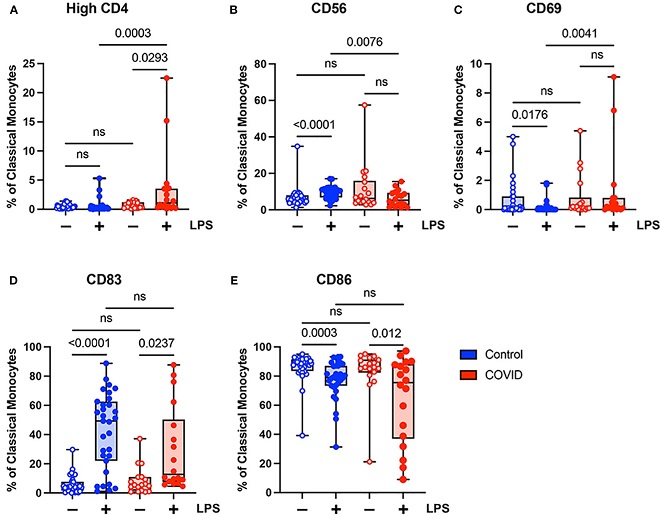Convalescent COVID-19 Patients Found To Have Reduced Monocyte Proportions And Monocytes That Were Hyporesponsive! Evidence Of Immune Dysregulation!
Nikhil Prasad Fact checked by:Thailand Medical News Team Jan 23, 2024 1 year, 11 months, 1 week, 6 hours, 35 minutes ago
The COVID-19 pandemic has brought significant challenges, not only due to the acute manifestations of the disease but also because of the lingering effects during the convalescent phase and in long COVID. A recent study conducted by the ARUP Laboratories Institute for Clinical and Experimental Pathology in Salt Lake City, Utah, and the University of Utah sheds light on the immune dysregulation observed in convalescent COVID-19 patients. The research covered in this
COVID-19 News report, specifically focuses on the alterations in monocyte proportions and their responsiveness, revealing intriguing evidence of immune dysregulation.
 Expression of activation markers is altered in classical (CD14+ CD16-) monocytes from convalescent COVID-19 patients. (A) CD4 percentage, (B) CD56 percentage, (C) CD69 percentage, (D) CD83 percentage, and (E) CD86 percentage (of classical monocytes) in convalescent COVID-19 (red, n=18) and control (blue, n=31) groups in the absence (empty) or presence (filled) of 100 ng/mL LPS. Comparison between groups (control vs. COVID-19) Mann-Whitney U test. Comparison within groups (untreated vs. LPS-treated) Wilcoxon ranked test. ns, not significant.
Understanding the Immune Response in COVID-19
Expression of activation markers is altered in classical (CD14+ CD16-) monocytes from convalescent COVID-19 patients. (A) CD4 percentage, (B) CD56 percentage, (C) CD69 percentage, (D) CD83 percentage, and (E) CD86 percentage (of classical monocytes) in convalescent COVID-19 (red, n=18) and control (blue, n=31) groups in the absence (empty) or presence (filled) of 100 ng/mL LPS. Comparison between groups (control vs. COVID-19) Mann-Whitney U test. Comparison within groups (untreated vs. LPS-treated) Wilcoxon ranked test. ns, not significant.
Understanding the Immune Response in COVID-19
The severity of COVID-19 symptoms is known to be linked to a dysregulated immune response, leading to complications such as inflammation, thrombosis, and organ dysfunction. This dysregulation is characterized by a phenomenon known as a cytokine storm, involving elevated levels of circulating cytokines and hyperactivation of immune cells. Myeloid cells, including monocytes, play a crucial role in mediating these pathological processes.
Acute Phase Findings
During the acute phase of COVID-19 infection, alterations in myeloid cells, particularly monocytes, have been extensively observed. Total monocyte counts tend to decrease, especially in severe cases. Furthermore, distinct changes in the proportions of classical, intermediate, and non-classical monocytes are noted, with a significant decrease in non-classical monocytes in moderate and severe cases. Phenotypic changes in monocytes, including increased CD83 expression and decreased HLA-DR expression, highlight their activation during acute infection.
Convalescent Phase and Long COVID
The fate of monocytes during the convalescent phase and in long COVID remains less clear. Some studies suggest an increase in non-classical monocytes in convalescent individuals, accompanied by elevated levels of inflammatory genes. However, contradictory findings, such as decreased monocyte percentages, underscore the need for more comprehensive studies to unravel the complexities of monocyte behavior in these phases.
The Utah Study's Approach
To delve deeper into the behavior of monocytes post-COVID, the researchers employed a comprehensive approach involving multiparameter flow cytometry and functional assays. The study focused on analyzing the phenotypic and functional characteristics of monocytes in the circulating blood from convalescent COVID-19 patients. Key aspects investigated included monocyte s
ubset proportions, activation status in response to bacterial lipopolysaccharide (LPS), and the ability to produce proinflammatory cytokines.
Results
The study's findings revealed several significant alterations in monocytes during the convalescent phase of SARS-CoV-2 infection:
-Decreased Monocyte Proportions: The percentage of total monocytes was found to be decreased in convalescent COVID-19 patients compared to uninfected controls.
-Subset-Specific Changes: Specifically, there was a notable decrease in intermediate and non-classical monocytes in convalescent patients, contributing to the overall reduction in monocyte proportions.
-Activation Marker Expression: Classical monocytes from convalescent patients displayed a hyporesponsive phenotype, characterized by decreased expression of activation markers (CD56) in response to LPS stimulation.
-Coagulation Cascade: Classical monocytes also exhibited decreased expression of CD142 (tissue factor), a key initiator of the extrinsic coagulation cascade, in response to LPS stimulation.
-Cytokine Production: Monocytes from convalescent COVID-19 patients produced lower levels of proinflammatory cytokines (TNF-α and IL-6) in response to LPS stimulation compared to uninfected controls.
Discussion and Implications
The study's findings shed light on the persistent effects of SARS-CoV-2 infection on monocyte subsets, activation status, and functional properties during the convalescent phase. The observed hyporesponsiveness of monocytes may have implications for dampening the inflammatory response and promoting tissue repair. However, it raises concerns about the potential deleterious role in the immune response to subsequent bacterial infections.
The study acknowledges certain limitations, including a single-time-point analysis and the need for longitudinal studies to capture changes throughout the acute to convalescent phases. Additionally, the relevance of these findings to new SARS-CoV-2 variants remains unknown, emphasizing the importance of ongoing research.
Conclusion
In conclusion, the study provides valuable insights into the immune dysregulation observed in convalescent COVID-19 patients, particularly in the behavior of monocytes. The altered proportions, activation status, and cytokine production suggest a nuanced and complex immune response during the convalescent phase. Further research is essential to fully comprehend the implications of these findings and their relevance to long-term health outcomes in individuals recovering from COVID-19.
The study findings were published in the peer reviewed journal: Frontiers in Immunology.
https://www.frontiersin.org/articles/10.3389/fimmu.2023.1329026/full
For the latest
COVID-19 News, keep on logging to Thailand Medical News.
